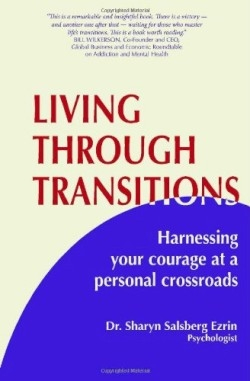Living Through Transitions
Harnessing Your Courage at a Personal Crossroads
Living Through Transitions demonstrates that fundamental personal change like greatness is sought by some and thrust upon others. One cannot jump to the end without working through the initial jolt and the trying middle difficult tasks eased by this book. The major division is between planned transitions which call for “courage of the mind” and traumatic unplanned transitions which make individuals reach inside for “courage of the heart.”
Unplanned events typically loom so monumental as to be dividing milestones in the lives of the people experiencing them—i.e. the death of a loved one or being fired. Such prima facie tragedies may actually end up being growth experiences but before one can view them as such there is a trial of time and a series of further challenges. Some friends then reveal themselves to be the fair-weather variety but those who willingly remain contribute to the crucial recovery of self-confidence.
A planned transition like ditching a steady-paying yet soulless job for a dream situation of lesser stability has the best chance of a happy outcome when the person undertaking it isn’t exhausted anxious or in debt. Ezrin suggests building a fund equivalent to a half-year’s expenses so a new occupational prospect can develop at a sustainable pace. She has no particular advice for working class or poor aspirants unable to set aside such a cushion a weakness more glaring than the limited age demographic of the target audience (boomers born between 1946 and 1964).
A huge positive aspect of planned change is the fact that various specific outcomes could turn out to be satisfying and sustainable. As a ghostwriter simply identified as “Bill” told Ezrin “Wherever an arrow makes a solid hit is where you draw the bullseye.” The groundwork for this book consists of seventy-five interviews with people who experienced major transitions. Illustrative anecdotes gleaned from interviews blend harmoniously with the general line of reasoning; commonalities of experience reinforce understandable instructions. The theories are more sensible than revolutionary. To increase lay readability in-text references to scholarly works are sparse though a more substantial bibliography is provided.
Ezrin worked as an executive coach and an outplacement counselor to the newly pink-slipped for twelve years and was employed as an organizational psychologist for twenty-five. Her base is in Ontario though her husband’s past career as a diplomat posted abroad provided opportunities to learn greater flexibility. Of life in India the author says “I allowed my own plans to merge with the unexpected along the way.” Banishing rigidity of mindset is certainly a precursor to a program of change. The other intentional decision which results reliably in forward progress is lending a hand to those who face struggles of their own. The author tells readers “When you offer to help others your goodwill energy and support will also nurture the courage in your heart.” Living Through Transitions takes all that and more but given a core of fortitude a handful of true friends and a little time for reflection and re-collection total restructuring can absolutely be accomplished.
Disclosure: This article is not an endorsement, but a review. The publisher of this book provided free copies of the book and paid a small fee to have their book reviewed by a professional reviewer. Foreword Reviews and Clarion Reviews make no guarantee that the publisher will receive a positive review. Foreword Magazine, Inc. is disclosing this in accordance with the Federal Trade Commission’s 16 CFR, Part 255.

